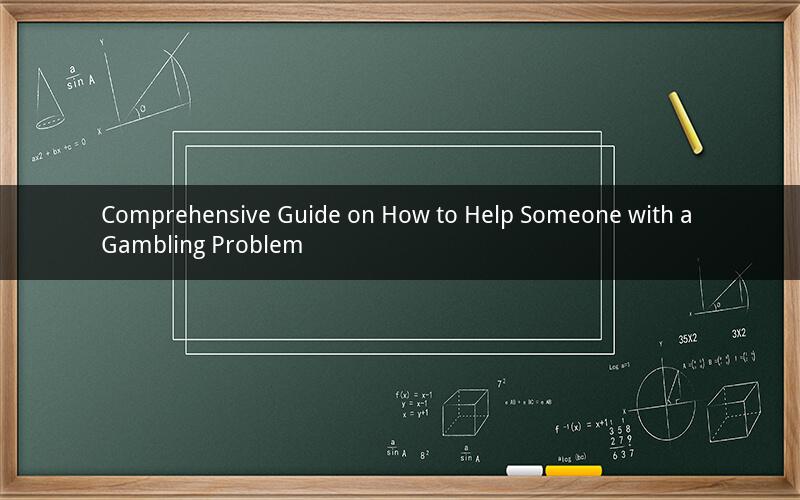
Introduction:
Gambling addiction is a serious issue that affects individuals, families, and communities. If you know someone who is struggling with a gambling problem, it's crucial to understand how to offer support and assistance. This article provides a comprehensive guide on how to help someone with a gambling problem, covering various aspects such as recognizing the signs, providing emotional support, and seeking professional help.
1. Recognizing the Signs of a Gambling Problem:
The first step in helping someone with a gambling problem is to recognize the signs. Here are some common indicators:
- Secretive behavior: Hiding gambling activities or lying about spending habits.
- Financial troubles: Borrowing money, selling personal belongings, or facing legal issues due to gambling debts.
- Emotional distress: Experiencing anxiety, depression, or mood swings.
- Isolation: Cutting off relationships with friends and family to continue gambling.
- Risky behavior: Increasing bets, chasing losses, or trying to win back money.
2. Providing Emotional Support:
Once you've recognized the signs of a gambling problem, it's important to provide emotional support to the individual. Here are some ways to do so:
- Listen actively: Offer a non-judgmental ear and allow the person to express their feelings and concerns.
- Show empathy: Acknowledge their struggles and reassure them that they are not alone.
- Encourage healthy coping mechanisms: Suggest activities such as exercise, hobbies, or therapy to help them manage stress and anxiety.
- Offer support groups: Encourage them to join support groups or seek counseling to connect with others who are facing similar challenges.
3. Encouraging Professional Help:
While emotional support is crucial, it's also important to encourage the individual to seek professional help. Here are some steps to take:
- Research treatment options: Find reputable treatment centers or therapists specializing in gambling addiction.
- Offer to accompany them: Show your support by accompanying them to appointments or therapy sessions.
- Help them understand the treatment process: Explain the various types of treatment available, such as counseling, medication, or residential programs.
- Encourage aftercare: Encourage them to participate in aftercare programs or support groups to maintain their recovery.
4. Setting Boundaries and Limits:
It's important to set boundaries and limits to protect yourself and the individual with a gambling problem. Here are some tips:
- Avoid enabling behavior: Do not lend money or cover their debts, as it may perpetuate their addiction.
- Communicate your concerns: Express your concerns about their gambling habits and how it affects both of you.
- Establish clear rules: Set boundaries regarding financial support, communication, and other aspects of your relationship.
- Seek support for yourself: It's important to seek support for yourself, whether through counseling or support groups, to cope with the emotional burden.
5. Educating Yourself and Others:
Educating yourself and others about gambling addiction is essential in providing effective support. Here are some resources and steps to take:
- Read books and articles: Familiarize yourself with gambling addiction, its causes, and treatment options.
- Attend workshops or seminars: Learn from experts in the field and gain insights into how to help someone with a gambling problem.
- Share information: Educate friends, family, and colleagues about gambling addiction to reduce stigma and promote understanding.
FAQs:
1. How can I tell if someone has a gambling problem?
Look for signs such as secretive behavior, financial troubles, emotional distress, isolation, and risky behavior.
2. What should I do if I suspect someone has a gambling problem?
Offer your support, listen actively, show empathy, and encourage them to seek professional help.
3. How can I help someone who is in debt due to gambling?
Avoid enabling behavior, communicate your concerns, and help them understand the consequences of their actions.
4. What types of treatment are available for gambling addiction?
Treatment options include counseling, medication, residential programs, and support groups.
5. How can I support someone during their recovery process?
Offer emotional support, encourage them to participate in aftercare programs, and help them establish healthy coping mechanisms.
Conclusion:
Helping someone with a gambling problem requires patience, understanding, and a willingness to support them through their journey to recovery. By recognizing the signs, providing emotional support, encouraging professional help, setting boundaries, and educating yourself and others, you can make a significant difference in their lives. Remember, recovery is a process, and with your support, they can overcome their gambling addiction and rebuild their lives.